School Year of Core Vocabulary Words – Older Student Lessons: Resources for January
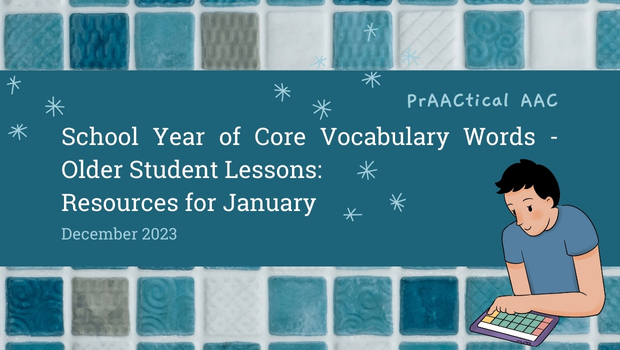
Welcome to the first post in the School Year of Core Vocabulary Words – Older Student Lessons Series! In this post, guest authors Michaela Sullivan and Lindsay Dougherty focus on a selected set of words to highlight for the month. In addition to their wonderful slide decks with activity ideas, they also share helpful implementation tips for using descriptive teaching/talking. Finally, don’t miss the data collection forms specific to Level 1 and Level 2 words.
SCHOOL YEAR OF CORE- Older Student Lessons
INTRODUCTION- January 2024
Happy New Year! Welcome back to a new School Year of Core Series, School Year of Core – Older Student Lessons (SYOC-OSLs), which was created for individuals in middle school through adulthood.
We hope that this new year brings joy, peace, and fulfillment to you and your learners. Thank you for continuing to pursue new ways to support your students and adult learners to communicate more fully, purposely, and effectively.
After we completed the SYOC Original Resource, (geared towards a younger population), we found that many of our older students and adult learners also needed this structured support to build an understanding and use of core words to express diverse communication functions, interact with others, self-regulate and self-advocate, etc. And so, alongside four phenomenal interns over the course of a school year, (2021-2022), the SYOC OSLs were brainstormed and created to meet the needs of a more underserved population of learners.
We hope you enjoy these resources as much as we do. These resources, however robust, are also fun! What’s also great is that once you download a copy of our (2) slide decks for each month, you can modify them to meet your individual student/learner needs. Thank you for checking out our SYOC-OSL resources.
To the Parents, Teachers, Educators, Related Service Providers, Speech-Language Pathologists, Paraprofessionals, Friends, and other curious professionals or communicators – Welcome to the newest iteration of the SYOC- Older Student Lessons (OSL), January edition.
Please download a copy of the Google Slide Decks for January Weeks 1-2 and Weeks 3-4, where Level 1 and Level 2 words are introduced across weeks. Also, we suggest that you consider downloading corresponding Symbol Charts containing January Level 1 and Level 2 words, and then the organization of the core words will make more sense (and, not only that, but you will also have hands-on, low-tech resources you can refer to, post and integrate during sessions), which we found to be helpful.
Because we have provided over 300 slides for the month of January, it would be impossible to complete all of the activities over the month. Our motto is, ‘Take what you want and leave the rest.’
Lessons incorporate a variety of activities to support core language understanding and use through motivating, engaging, meaningful activities which also incorporate social-emotional learning.
We provide a variety of resources so that you would have a greater chance of finding activities to meet your diverse student(s) needs and interests. We hope that you and your students/adults enjoy these resources created in modifiable Google Slides.
Our content is diverse, but we have monthly themes. January’s themes include New Year’s Day, New Year’s Resolutions, Chinese New Year, and Media (including cartoon characters and superheroes and technology).
All Slide Decks contain:
- Icebreaker Activities, (e.g. Jokes, Would You Rather, National days)
- Monthly Language Resources Include: Tell us a Story slides, to support students to co-construct narratives about pictures and/or meaningful photos given WH question scaffolds, Get Off the Computer suggestions for Shared Reading and Share a Word to Describe your Day. We added a few slides with Shared Reading suggestions and a topic/interest inventory where students/adults can share the topics they are most interested in. We added a few slides to support self-care. Additionally, there is a slide that can be duplicated for Student Reflection Time- when they are asked whether they enjoyed an activity.
- Symbol charts across a wide array of devices
- Word/Thought Bubble for Level 1 and Level 2 words
- A slide to Ask about and Share Feelings (incorporating aspects of Social-Emotional Learning) and visual supports/suggestions to share what they did over the weekend.
- Music Choices, corresponding to themes and core words
- Media (Animated Shorts and Short Video Clips)
- Predictable Chart Writing
- Reading
Please note that although these resources were created for AAC users, we found that they could also be utilized effectively with a variety of students.
We hope you enjoy the School Year of Core-Older Student Lessons for JANUARY.
The Strategy of the Month is Descriptive Teaching
THE WORDS
Weeks 1-2
- Level 1 Words: he, she, is, sleep, come, all gone, can, big, little.
- Level 2 Words: own, touch, hit, hold, wave, hurry, light, dark
Weeks 3-4
- Level 1 Words: this, tell, show, again, fun, you’re welcome, when
- Level 2 Words: strong, heavy, middle, between, know, at, surprise, I don’t know
Level 1 Words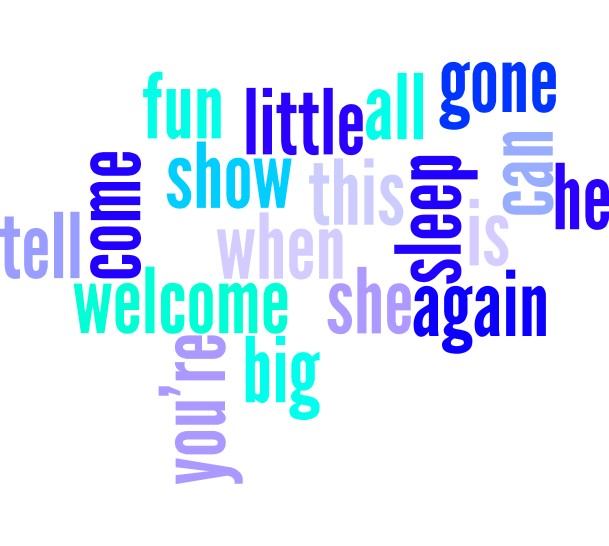
Level 2 Words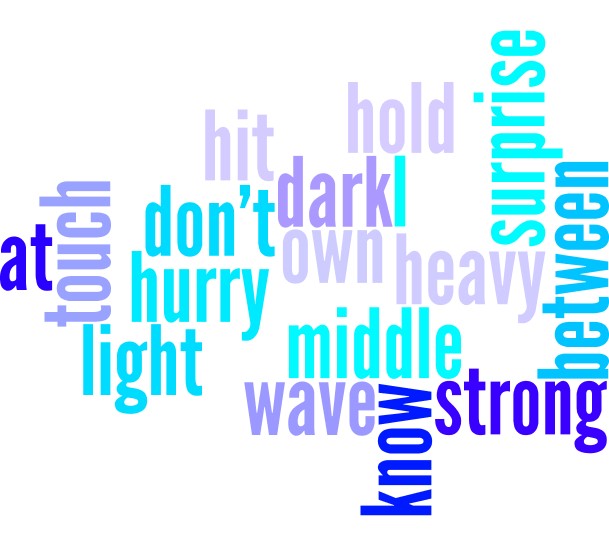
Please make a copy of our Google Slides resources for Weeks 1-2 and weeks 3-4.
THE SYMBOLS
You can download grids with the symbols for this month’s words from the lists below. These handy visual tools can help us remember what words to focus on and be useful in our intervention and instruction.
Level 1 Words
- Avaz
- CoughDrop
- LAMP Words for Life
- Wordpower 60 Basic
- Unity 45 Sequenced
- Unity 60 Sequenced
- Unity 84 Sequenced
- Blank Grid (add your own symbols)
Level 2 Words
- Avaz
- CoughDrop
- LAMP Words for Life
- Wordpower 60 Basic
- Unity 45 Sequenced
- Unity 60 Sequenced
- Unity 84 Sequenced
- Blank Grid (add your own symbols)
The Google Slides Resources
Weeks 1-2 and Weeks 3-4 can be downloaded below
Strategy of the Month- January
Descriptive Teaching Strategy: Summary
The Descriptive Teaching Model is a strategy used by many teachers and therapists to help AAC users learn to use core vocabulary to describe topics or curricular-specific vocabulary or nouns. (Van Tatenhove, 2009). By providing open-ended questions to foster the expression of ideas, individuals can learn to use core vocabulary more flexibly to answer questions by describing words if they do not have the specific vocabulary word programmed on the device. Focusing on the use of core vocabulary to express the concepts, ideas, and features of the target word can build more flexible use of core vocabulary and lead to increased communicative competence.
——————————————————————–
The Descriptive Teaching Model is a strategy used by many teachers and therapists to help individuals who use AAC systems, learn to use core vocabulary to describe topic or curricular specific vocabulary or nouns. (Van Tatenhove, 2009). By providing open-ended questions to foster the expression of ideas, individuals can learn to use core vocabulary more flexibly to answer questions by describing words if they do not have the specific vocabulary word programmed on the device. The opposite teaching approach is Referential teaching, where posed questions necessitate a specific answer. To provide an example to illustrate the two different approaches, when learning about the word: tide, using a Descriptive Teaching approach, individuals could respond with core words such as water, go, in, out, up, and down, whereas in the referential teaching model, the individual would be required to provide the specific word to answer a question. Focusing on the use of core vocabulary to express the concepts, ideas, and features of the target word can build more flexible use of core vocabulary and lead to increased communicative competence.
Please find the following additional resources on the Descriptive Teaching Model. These resources may be helpful for team training.
- Using Descriptive Teaching to Support the Learning of AAC Users (By Avaz) 2020
- Teaching Learners with Special Needs (Descriptive Teaching Mode) by Kate Ahearn September 15, 2015
- Core Vocabulary and Descriptive Teaching in AAC Enders/McGowan
- Communication All Day Long! AAC in the Classroom, Dr. Musselwhite, Pattan Conference (PDF) Many examples of Descriptive Teaching
- Descriptive Teaching Model-Video By Language During Mealtimes (Becca Eisenberg). Featured on PrAACtical AAC on October 21, 2020
- From Referential to Descriptive Teaching with AAC Learners (Video) by Deborah Witkowski, Featured on PrAACtical AAC on April 25, 2018
- Teaching Methods: The Descriptive Teaching Model (by Saltillo)
- Descriptive Vs Referential Teaching PDF
DATA COLLECTION & ACCOUNTABILITY FORMS
Taking data to measure performance and keeping track of our own modeling behavior are two things we can do to strengthen our AAC teaching. Here are some forms that you can use to support those efforts.
This posting is dedicated to all of you SLPs, parents, educators, and therapists who are making a difference every day!
About the School Year of Core-Older Student Lessons Series Authors
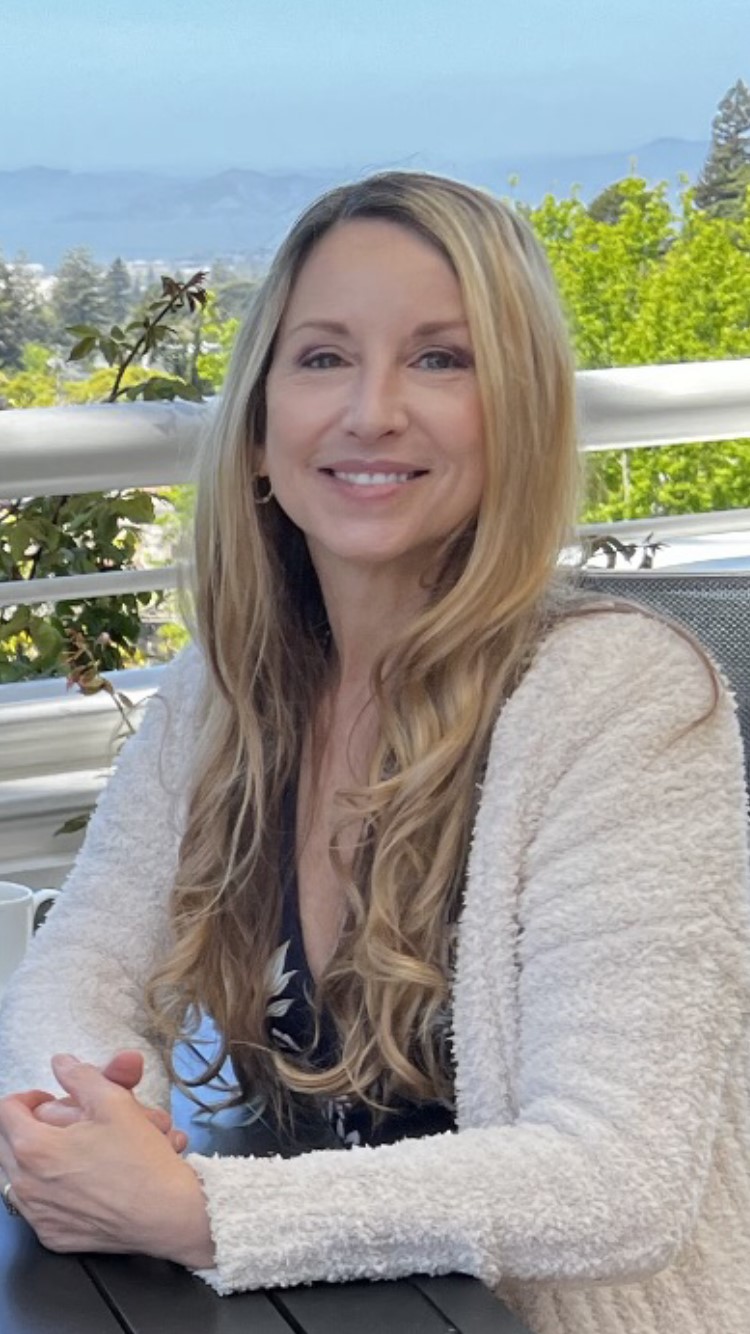 Michaela Sullivan is an SLP who specializes in the fields of AAC and AT. She currently works within the San Francisco Unified School District on the AAC Support Team where she supervises graduate student interns, works in a transition program and on special projects. Ms. Sullivan also has a private practice. She has been a presenter in the field of Speech-Language Pathology and AAC at state and national conventions. She was one of the creators of the Original School Year of Core first released in 2020 on the websites: PrAACtical AAC and AAC Language Lab. Ms. Sullivan works closely with San Francisco State with Project AAC for ALL, SYOC Bilingue and the TRAAC Project. Ms. Sullivan serves as a Board member, Treasurer and Volunteer for the Nika Project, providing services, supports, resources, training, and repurposed equipment to help meet the needs of individuals who use AAC systems both locally and internationally.
Michaela Sullivan is an SLP who specializes in the fields of AAC and AT. She currently works within the San Francisco Unified School District on the AAC Support Team where she supervises graduate student interns, works in a transition program and on special projects. Ms. Sullivan also has a private practice. She has been a presenter in the field of Speech-Language Pathology and AAC at state and national conventions. She was one of the creators of the Original School Year of Core first released in 2020 on the websites: PrAACtical AAC and AAC Language Lab. Ms. Sullivan works closely with San Francisco State with Project AAC for ALL, SYOC Bilingue and the TRAAC Project. Ms. Sullivan serves as a Board member, Treasurer and Volunteer for the Nika Project, providing services, supports, resources, training, and repurposed equipment to help meet the needs of individuals who use AAC systems both locally and internationally.
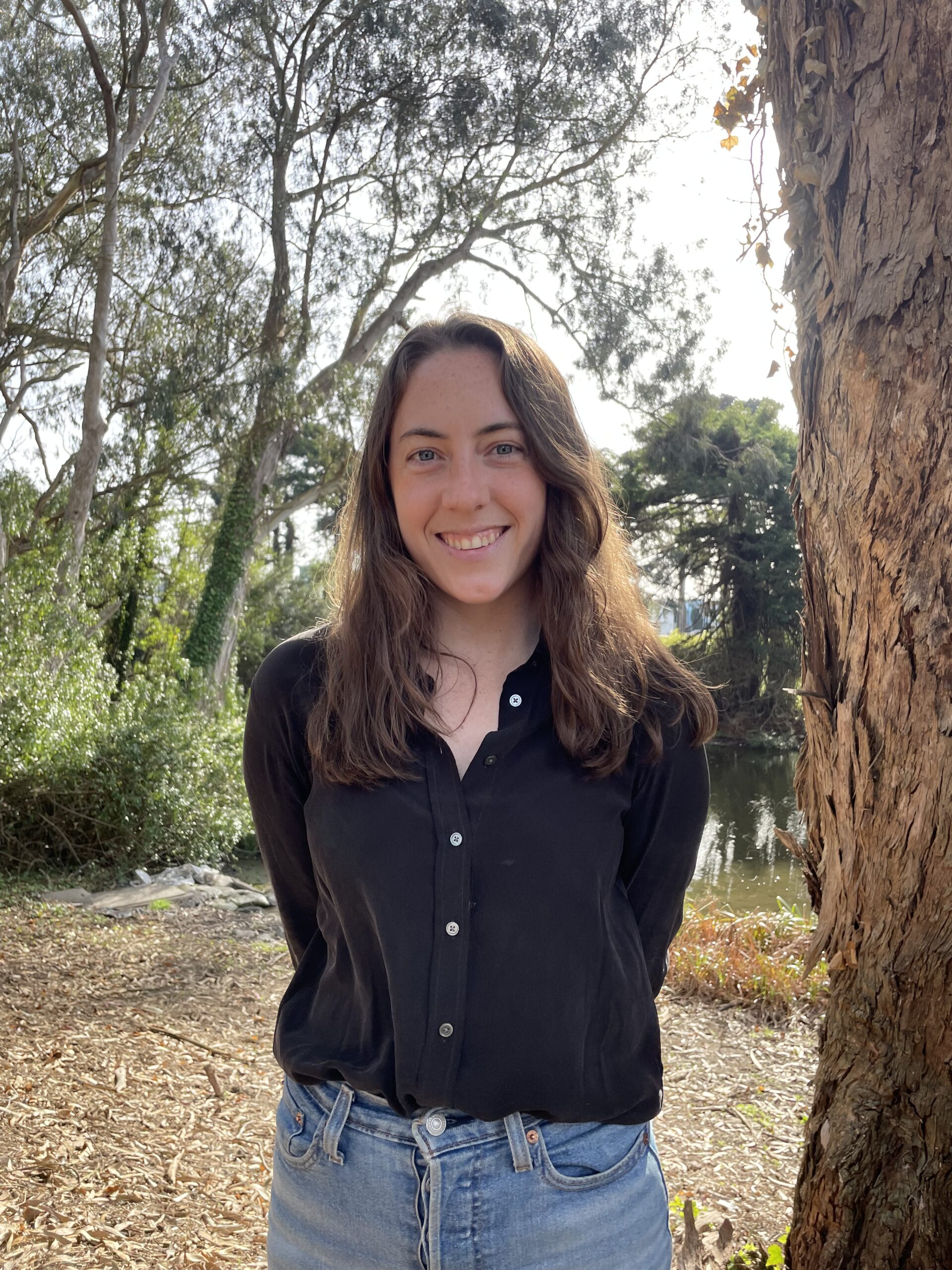 Lindsay Dougherty is a Speech & Language Pathologist with specializations in Autism and AAC. She currently works for the San Francisco Unified School District, providing direct services to students with complex communication needs and supporting her fellow SLPs on the AAC Support Team. Lindsay works on a team of professionals, implementing a Language Systems First curriculum for Pre-K and Kindergarten classrooms across the school district. The team provides a universal language system, staff and parent training, and AAC support to teachers and SLPs. She is also the faculty advisor of her middle school’s Best Buddies Club, where she supports students with disabilities in building meaningful friendships with peers.
Lindsay Dougherty is a Speech & Language Pathologist with specializations in Autism and AAC. She currently works for the San Francisco Unified School District, providing direct services to students with complex communication needs and supporting her fellow SLPs on the AAC Support Team. Lindsay works on a team of professionals, implementing a Language Systems First curriculum for Pre-K and Kindergarten classrooms across the school district. The team provides a universal language system, staff and parent training, and AAC support to teachers and SLPs. She is also the faculty advisor of her middle school’s Best Buddies Club, where she supports students with disabilities in building meaningful friendships with peers.
Our Featured Core Contributors for the Month of January include:
Jadine Veluya, Christelle Marcelo, Joseph Cachapero and Yan Zheng
Filed under: Featured Posts
This post was written by Carole Zangari

2 Comments
I downloaded the two PPT for Jan, and unfortunately, the majority of the content is not accessible. There is an error message that “Powerpoint found a problem with content in [download]. Powerpoint can attempt to repair the presentation. If you trust the source of this presentation, click repair.” I click repair and then most of the content in the PPT is not available and there is a further error message “powerpoint couldn’t read some content in [download]- repaired and removed it. Please check your presentation to see if the rest of it looks ok”. It looks like you guys are spending a good amount of time on these resources, but they are not accessible to anyone at this time (or so it seems from my experience). May want to look into what the issue is/consider using google slides instead?
Dear Nicole, Thanks so much for reaching out and for sharing your challenges accessing the SYOC-OSL resources. (That is very frustrating). I’m sure we can figure this out. We created these resources in Google Slides so that others would be able to make a copy and then modify them as needed.
Question: When you opened the slide decks for the January lessons, (in this specific posting), did they open in Google Slides for you? For me, they open in Google Slides in “View Only.”
I looked back at our Introductory posting, named: School Year of Core Vocabulary Words: Introducing Lessons for Older Students. Here is the link: https://praacticalaac.org/praactical/school-year-of-core-vocabulary-words-introducing-lessons-for-older-students/ (In this posting, you are right, they were provided in PPT. Please utilize this posting to access the resources in Google Slides and I am hoping that your challenge will be solved.
Here is the link: https://praacticalaac.org/featured-posts/school-year-of-core-vocabulary-words-older-student-lessons-resources-for-january/
Please try opening the resources again in this posting and let us know if it works for you.
Thanks so much for telling us about this glitch and we’ll remedy it as soon as possible.
Thank you for your support of the School Year of Core- Older Student Lessons.
With Gratitude,
Michaela